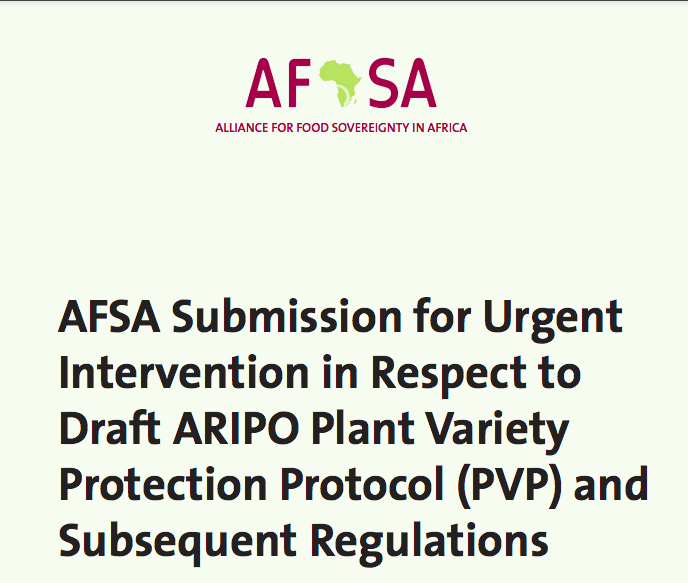Latest Resources

28 August 2023
Seed harmonisation in Eastern and Southern Africa
Failures, corporate occupation, and the rise of digitalised seed trade: dire implications for farmer managed seed and food systems in Africa Regional seed policy harmonisation processes on seed and plant variety protection (PVP) legislation have been underway for the past 15 years on the African continent. These have taken place under the auspices of various […]

8 October 2019
Crunch Time for the Seed Treaty
A review of some outstanding issues in the negotiation Will the effort to fix ITPGRFA’s broken benefit sharing system measure up to expectations? (Veuillez cliquer ici pour le français) (Por favor, haga clic aquí para el español) This paper reviews the key outstanding issues that are expected to be discussed by the ITPGRFA Governing Body, […]

16 August 2019
Africa must ban glyphosate now!
Thank you for supporting our continental campaign to ban glyphosate The deadline for signing on to the petition was Friday, 30 August, 2019. In the next phase of the campaign, many organisations around the continent are sending letters to their governments calling for a ban. In this paper we explain why. Globally, glyphosate and glyphosate-based […]

1 September 2017
WEMA Project shrouded in secrecy: open letter to African governments to be accountable to farmers...
The Water Efficient Maize for Africa (WEMA) project promises to develop drought tolerance in maize for the benefit of small holder farmers, but is really a project designed to facilitate the spread of hybrid and genetically modified (GM) maize varieties on the continent. WEMA involves five African countries: Kenya, Mozambique, South Africa, Tanzania and Uganda. […]

10 August 2017
The Water Efficient Maize for Africa Project: Profiteering not Philanthropy
This scoping study aims to appraise, to the best of our knowledge, the current status of the roll-out of a public- private partnership which forms the the Water Efficient Maize for Africa (WEMA) project in five African countries: Kenya, Mozambique, South Africa, Tanzania and Uganda. The partnership is between the African Agricultural Technology Foundation (AATF), […]

28 November 2016
Biosafety aspects of genome-editing techniques
Biosafety TWN Briefing – Biosafety aspects of genome-editing techniques. You can download the paper here.

28 July 2016
ACB Preliminary comments on Draft Regulations Implementing the Arusha Protocol for the Protection...
Draft Regulations for the implementation of the African Regional Intellectual Property Organisation’s (ARIPO’s) Arusha Protocol for the Protection of New Plant Varieties (Arusha Protocol), were considered for adoption in June 2016. The proposed regulations included provisions designed to intimidate and force seed processors, seed suppliers, government certification officers and even farmers’ organisations to police and […]

11 June 2014
AFSA Makes Small Gains for Farmers’ Rights in Draft SADC PVP Protocol
AFSA members participated at a SADC Regional Workshop that took place 13-14 March 2014, in Johannesburg, South Africa. The aim of the workshop was to review the draft SADC PVP Protocol. After marathon, highly contentious and difficult discussions, AFSA members were able to persuade member states to amend key provisions in the draft SADC PVP […]

31 January 2011
Water Efficient Maize for Africa: Pushing GM Crops onto Africa
This paper looks at the Water Efficient Maize for Africa (WEMA) project within the context of the race by massive agribusiness corporations to bring climate change related crops to the market. The first part of the paper explains the WEMA project within this context, outlining the players and the stakes involved. It looks at who […]

28 October 2010
Synthetic Biology in Africa: Recent Developments
By Gareth Jones and Mariam Mayet The focus of this paper is the emerging field of synthetic biology, in particular its implications for the African continent. Synthetic biology combines a number of scientific disciplines and is generally understood to involve the deliberate design of biological systems, using standardised components that have been created in a […]
